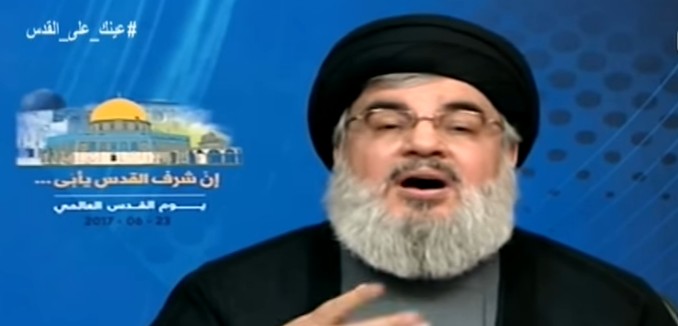In the latest iteration of economic warfare against Iran and its proxies, the United States and its Gulf allies imposed new sanctions on Hezbollah and its top officials, Reuters reported Wednesday.
The sanctions targeted Hezbollah leader Sheikh Hassan Nasrallah, his deputy Naim Qassem, and the group’s decision-making body, the Shura Council. Hezbollah is an Iranian-backed terror group that exercises complete political and military control over Lebanon.
While the United States expanded the sanctions against Nasrallah, who was sanctioned in 1995 for threatening to disrupt peace talks and in 2012 for his support of Bashar al-Assad in Syria, this is the first time Qassem has been targeted with sanctions.
The sanctions were imposed in conjunction with the Terrorist Financing Targeting Center (TFTC), which includes Saudi Arabia, Bahrain, Kuwait, Oman, Qatar, and the United Arab Emirates (UAE). Despite being targeted by Hezbollah in the past, Kuwait was not involved in sanctioning Nasrallah.
“The TFTC again demonstrated its great value to international security by disrupting Iran and Hizballah’s destabilizing influence in the region. By targeting Hizballah’s Shura Council, our nations collectively rejected the false distinction between a so-called ‘Political Wing’ and Hizballah’s global terrorist plotting,” said Secretary of the Treasury Steven T. Mnuchin in a statement announcing the sanctions. “Under the dictates of the Iranian Revolutionary Guard Corps-Quds Force (IRGC-QF), Secretary General and head of the Shura Council Hasan Nasrallah is prolonging the human suffering in Syria, fueling the violence in Iraq and Yemen, putting the Lebanese state and the Lebanese people at risk, and destabilizing the entire region.”
In addition to sanctioning Nasrallah and Qassem, the U.S. and its partners sanctioned Muhammad Yazbak, Husayn Al-Khalil, and Ibrahim al-Amin al-Sayyid for acting on behalf of Hezbollah. The sanctions imposed mean that all property of the sanctioned individuals is frozen and must be reported to Treasury’s Office of Foreign Assets Control (OFAC). No one in the U.S. or traveling through the U.S. is allowed to transact business with the sanctioned individuals or their property.
There were four other individuals who were sanctioned. Moreover, ISIS in the Greater Sahara was designated as a foreign terrorist organization.
Saudi Arabia, Bahrain, Kuwait, Oman, Qatar, and the UAE are all members of the Gulf Cooperation Council, which designated Hezbollah as a terrorist group in 2016.
Earlier this the Treasury Department sanctioned the Central Bank of Iran, and its chief, Valiollah Seif, for secretly sending millions of dollars to Hezbollah through IRGC-QF. Last week the Treasury Department announced that it had broken up a money laundering scheme, with help from the United Arab Emirates, that provided millions of dollars to IRGC-QF, which is in charge of the IRGC’s foreign operations.
In related news, French energy giant, Total, announced that it was pulling out of a deal to help Iran develop the South Pars gas field unless it “is granted a specific project waiver by U.S. authorities with the support of the French and European authorities,” due to fears of being sanctioned by the U.S.
[Photo: قناة افاق الفضائية / YouTube]




